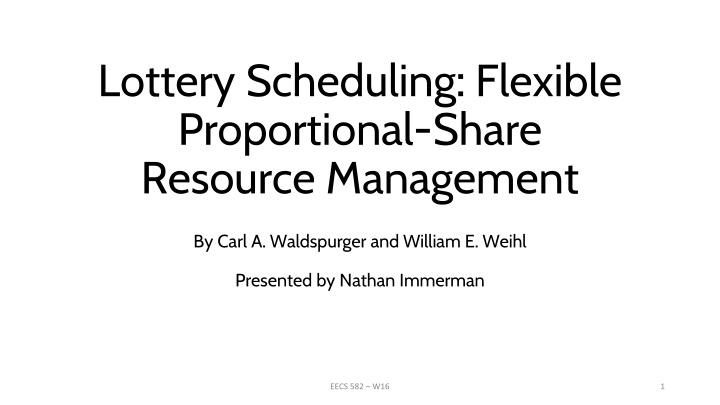
Lottery Scheduling in Resource Management
Explore the concept of Lottery Scheduling for flexible and proportional resource management, as discussed by Waldspurger, Weihl, and Immerman. Learn about ticket-based allocation, fair throughput, and the efficiency of this scheduling approach. Discover how fairness is achieved over time and the relative rate accuracy in resource allocation control.
Download Presentation

Please find below an Image/Link to download the presentation.
The content on the website is provided AS IS for your information and personal use only. It may not be sold, licensed, or shared on other websites without obtaining consent from the author. If you encounter any issues during the download, it is possible that the publisher has removed the file from their server.
You are allowed to download the files provided on this website for personal or commercial use, subject to the condition that they are used lawfully. All files are the property of their respective owners.
The content on the website is provided AS IS for your information and personal use only. It may not be sold, licensed, or shared on other websites without obtaining consent from the author.
E N D
Presentation Transcript
Lottery Scheduling: Flexible Proportional-Share Resource Management By Carl A. Waldspurger and William E. Weihl Presented by Nathan Immerman EECS 582 W16 1
Outline Standard Scheduling Lottery Scheduling Other Applications Conclusion 2
Standard Scheduling First In First Out (FIFO) Round Robin Earliest Deadline First (EDF) Others... Priority Schemes usually ad hoc 3
Lottery Scheduling Randomized Proportional-Share Scheduling Tickets Lotteries Ready Queue Ticket Transfers Ticket Currencies 4
Tickets Abstract: independent of machine details Relative: ticket importance depends on total number of tickets Uniform: easily represent heterogeneous resources 5
Lotteries Priority is determined based on number of tickets each thread has Scheduler picks a winning ticket randomly Probabilistically Fair Throughput is proportional to number of tickets Latency is inversely proportional to number of tickets 6
Ready Queue Pick random ticket - find thread holding the winning ticket. O(n) Analogous to having an ordering of tickets, and finding the nth ticket Improvements Sort threads by number of tickets - improves average search time Create tree of partial ticket sums where threads are the leaves. O(logn) 7
How fair is lottery scheduling? Relative Rate Accuracy: Lottery scheduling can successfully control the distribution of allocated resources. Two tasks were run with various allocated ratios. The x-axis plots the ticket allocated ratio (ex. 5:1 or 8:1) and the y-axis plots the observed allocation ratio. 8
How fair is lottery scheduling? Fairness Over Time Two threads were run with a ticket ratio of 2:1. Over the entire run their average iterations/sec were 25378 and 12619 respectively, for an average 2.01:1 ratio. 9
Flexible Control Dynamic Execution Rates Three tasks are running a Monte- Carlo simulation Tasks periodically changes their ticket allocation to be proportional to their error 10
Ticket Transfers Explicitly transfer tickets to another task Useful when a task blocks for any reason RPC: A task can transfer tickets to the task running on the server on its behalf Solves priority inversion 11
Ticket Currencies Currencies create logical tasks groups Funded by tickets in base currency Lotteries still evaluated on base currency 12
Ticket Currencies Introducing more tickets in currency B has no effect on distribution of currency A Currencies A and B have equal funding The ratio of A1:A2 and B1:B2 is 1:2 B3 is introduced with a ratio of B1:B2:B3, 1:2:3 13
Other Applications Mutex Acquisition When a task is waiting for a mutex it transfers all of its tickets to the mutex currency. The mutex holds a lottery on the mutex currency to give lock. Page Faults Hold a inverse lottery to determine which page is swapped out of memory 14
Conclusion Randomized Proportional-Share Scheduling Fair, Flexible, Simple to Implement, Dynamic Priorities Overhead comparable to standard Mach timesharing policy 15
